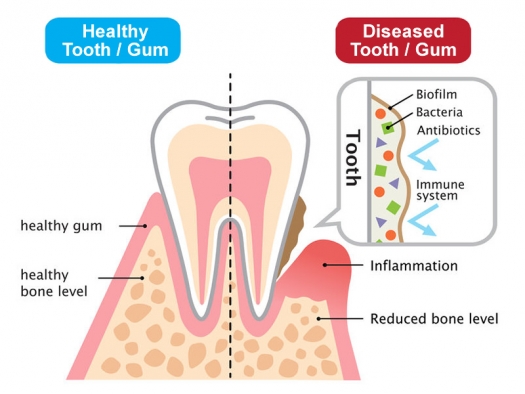HealthyVsDiseasedToothGum.jpg

Illustration by yomogi / 123rf.com
FAIM has learned there are so many aspects to dental health that affect our entire body. Years ago I learned of the dangers of amalgam fillings and had all of mine removed.
Many professionals say disease begins in the gut and colon, but it is quite possible it begins in the mouth, as well. Infected teeth, gums, tonsils and sinuses are responsible for many heart attacks, breast cancers, and chronic degenerative diseases.
So what are some of these issues that arise in the mouth? They involve bacteria and dental procedures. FAIM has learned about concerns and treatment options to help you in your decision-making when you have dental issues. The key is to be educated and ask questions of your dentist. If you don’t get your questions answered then look for a new dentist who is up to date on these important issues.
The same bacteria in the mouth can be found in atherosclerotic plaque lining the coronary arteries, leading to heart disease. Often these oral infections are painless and as a result, go untreated. Rarely do people with heart disease suspect their oral health but it should be the first consideration.
The most clinically devastating dental infection is the root canal treated tooth. 3D Cone Beam Imaging is a new diagnostic x-ray tool that can reveal pools of infection that are present around root canal treated teeth but often missed by regular x-ray exams. In a healthy tooth the blood flows through the pulp chamber and through the dentin tubules keeping the tooth flushed. With a root canal the canal is cleaned out, disinfected and sealed. However, it is impossible to completely sterilize the tooth. The dentin tubules no longer circulate nutrients but now harbor bad bacteria. Bacteria from the mouth can also flow through the enamel and into these dentin tubules since the flushing mechanism is no longer functioning. Bacteria and exotoxins from the bacteria migrate all over the body through the blood stream causing many diseases. Holistic dentists recommend removing root canal teeth especially if the body is in a disease state. It is important to go to a dentist who will remove the tooth properly including removing the bone surrounding the tooth socket and allowing it to bleed freely. If a root canal is recommended by your dentist, investigate all other options and opt out on the root canal for the sake of your health.
Amalgam fillings are a source of mercury contamination in the body. Instead choose composite fillings. If you have amalgams currently, find a dentist who has studied safe removal to avoid further mercury poisoning. The IAOMT has a list of trained dentists. After removing amalgam fillings, do a full body detox to clear accumulated mercury.
Cavitation is an infection in the jaw bone where a tooth has been extracted. It is rarely painful, but can be disastrous to your health. Again, a 3D Cone Beam x-ray can detect cavitations. The treatment involves surgically debriding the area with a laser and ozone, irrigating with ozone water, packing the site with the patient’s platelets, and IV Vitamin C to boost the immune system.
In Chinese medicine there are 12 meridians. Each tooth relates to a specific meridian and ultimately to an organ or body part. When a health issue pertains to an organ, look at the meridian using the Meridian Tooth Chart for that organ and the corresponding tooth. In order to heal, the tooth involved must be addressed. In a majority of breast cancer patients, doctors find a root canal on the same side of the mouth as the breast tumor. Many foreign cancer clinics have an onsite holistic dentist because they have found it is paramount to clear up any dental issues for a successful treatment and recovery.
So how do we avoid gingivitis, root canals and other bad infections in the mouth? First use beneficial dental therapies such as composite fillings, no root canals, care when extracting teeth, and a good oral hygiene program. Oil pulling is a great preventative measure. Swish 2 tsp of coconut oil in the mouth for 8-20 minutes. Spit the oil into a receptacle and not down the drain to avoid clogging the pipes. This practice gives you improved oral health, whiter teeth, fresher breath, reduced infections, tighter gum junctions, reduced plaque and reduced gum disease.
Lastly, the dental materials used in your mouth matter. Using mercury, aluminum, nickel and palladium, for example, have a high potential to be toxic. However, even other material that seem harmless could be toxic to you if you have an allergy or sensitivity. The Clifford Material Reactivity Test, which is a blood test, will accurately tell you what materials will be compatible in our mouth.
There is a lot to consider these days when you go to the dentist. Educate yourself to avoid the pitfalls.


